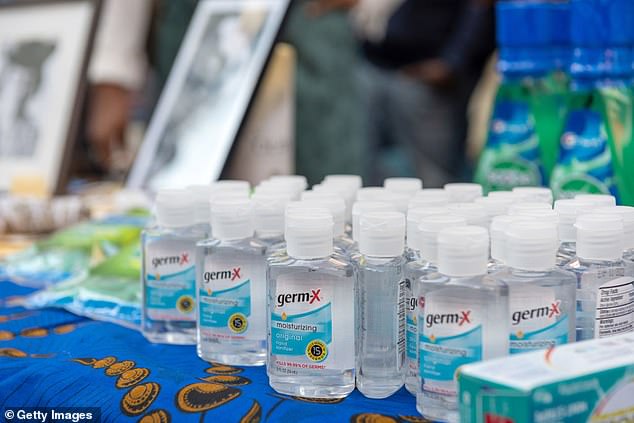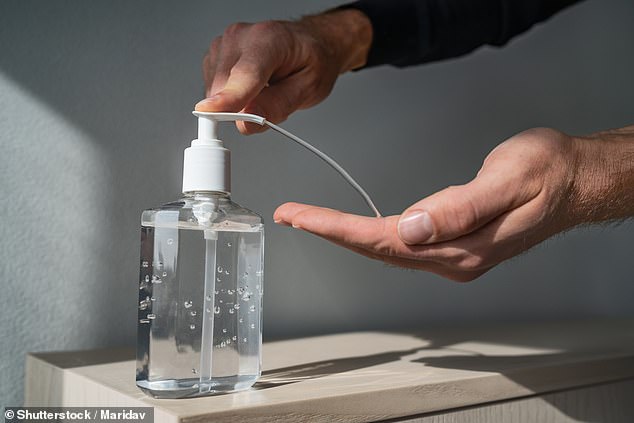A 26-year-old alcoholic was so desperate to get his fix that he stole several bottles of hand sanitizer so he could get drunk on the alcohol inside.
The anonymous patient, from France, visited his local emergency room complaining of severe abdominal pain.
Despite a normal examination and receiving pain medication, the patient continued to report that his pain had not subsided and he became nervous.
When additional tests and more doctors couldn’t find anything wrong with him, the man’s roommate informed a nurse that the patient had been taking bottles of hand sanitizer, hiding them in his bag and drinking them throughout his stay.
Doctors found several bottles of disinfectant in her bag, of which about 1.5 had been consumed.
An anonymous 26-year-old patient in France suffered alcohol poisoning after his addiction led him to steal and drink hand sanitizer.
The man admitted to faking his pain to gain access to the sanitizer, which contained about 80 percent pure alcohol, because he was experiencing withdrawal symptoms due to addiction.
When the patient first arrived at the emergency room, doctors wrote that he was irritable and “at times verbally aggressive.”
They noted that her abdominal exam and vital signs were normal, although she had “poor general hygiene” and a slightly elevated heart rate.
He was given several intravenous medications, including morphine for pain, although he remained agitated. When the patient continued to complain of pain, other doctors sent him for an abdominal CT scan, which revealed no potential cause for his pain but instead showed that he had a fatty liver, which is often a sign of alcohol use disorder.
Her blood tests showed slightly elevated liver enzymes, a sign of liver damage or inflammation.
Shortly after testing, the patient’s roommate told her the news about the hand sanitizer. Hospital staff found seven 16-ounce bottles in her bag, and about one and a half had been consumed in about four to six hours.
Further blood tests revealed the patient’s blood alcohol level was 0.2 percent, or two and a half times the legal limit.
Doctors said this hand sanitizer contains 80 percent alcohol. A can of beer contains only five percent. This means the bottle and a half this patient drank is equivalent to 24 drinks.
The patient admitted that he had been drinking the sanitizer to relieve his alcohol withdrawal symptoms.
The patient’s medical team warned that alcoholics can become so desperate that they exhibit bizarre alcohol-seeking behavior to get a fix.
Each bottle contained approximately 16 times more pure alcohol than the average beer.
Doctors who treated the patient warned of an increase in such incidents as the Covid pandemic made hand sanitizer more widely available, particularly in hospitals.
“Hand sanitizers are undoubtedly essential tools to fight infections, protecting both the user and others,” the doctors wrote.
“It is a major challenge to ensure the safety of alcoholic patients in the emergency room while maintaining good hand hygiene policies.”
For example, A study Calls to poison control centers were found to have increased by 79 percent since the start of the pandemic.
And deaths from excessive alcohol consumption increased 29 percent from 2020 to 2021 compared to 2016 to 2017, according to the latest available data from the CDC.

The National Poison Center in the Capital Region recommends calling your local poison control center immediately if you ingest hand sanitizer.
“With the increased production and availability of hand sanitizer, there has been an increase in its abuse in cases of poisoning, and physicians and staff must always be vigilant to prevent abuse,” the doctors wrote.
The team also called for more sanitiser dispensers to be installed, securely fixed to walls and monitored by staff. They also warned that substance abusers “tend to be manipulative”.
The National Poison Control Center warns that ingesting hand sanitizer can slow heart rate and breathing, which can put patients into a coma. It has also been shown to cause liver and kidney damage.
The agency recommends calling your local poison control center immediately if you ingest hand sanitizer.
Doctors gave him fluids and infusions of vitamins B1, B3 and B6 to reduce the toxicity of the alcohol and to hydrate him. He was admitted to the hospital for observation for 24 hours.
When he was discharged, he was referred to addiction specialists.
The case was published in the American Journal of Case Reports.

